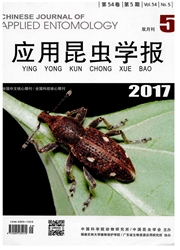

 中文摘要:
中文摘要:
寄主植物是影响昆虫抗寒性的主要因子之一。研究了不同温度下甜菜夜蛾Spodoptera exigun(Hiibner)3龄幼虫取食小白菜、甘蓝、葱和菠菜后,对过冷却能力和体内冷冻保护剂的影响。结果表明,寄主植物对甜菜夜蛾3龄幼虫的过冷却能力有显著性影响,其中以取食甘蓝的幼虫过冷却点最低。温度和寄主植物对其过冷却点、结冰点和虫体含水量有明显的交互作用。寄主植物对其体内的海藻糖含量有显著性影响,而对甘油和糖原含量没有显著性影响。温度和寄主植物仅对海藻糖含量有显著的交互作用。随着温度的升高,取食不同寄主的幼虫体内海藻糖和糖原含量的变化趋势完全相反,认为海藻糖是由糖原转化而来。研究结果提示冬季合适的寄主植物有利于甜菜夜蛾低龄幼虫越冬。
 英文摘要:
英文摘要:
Host plant selection is one of the important factors affecting the cold-hardiness of insects. Supercooling capacity and cryoprotectant effects of feeding on pakchoi, cabbage, shallot and spinach under different temperature conditions were studied in 3rd instar larvae of the beet armyworm, Spodoptera exigua (Htlbner) (Lepidoptera: Noetuidae). The results indicated that the host plant significantly influences supercooling capacity, with 3rd instar larvae fed on cabbage having the lowest supercooling point. Supercooling point, freezing point and body water content were significantly affected by the interaction between host plant and temperature. Although glycerol and glycogen content showed little variation between the experimental groups, trehalose content was significantly affected by both host plant species and the interaction between host plants and temperature. Trehalose and glycogen levels in 3'd instar larvae fed on different host plants displayed opposite trends with increasing temperature, and we consider that the trehalose was increased by conversion from glycogen. Our results suggest that appropriate host plant selection can improve overwintering ability of young S. exigua larvae.
 同期刊论文项目
同期刊论文项目
 同项目期刊论文
同项目期刊论文
 期刊信息
期刊信息
